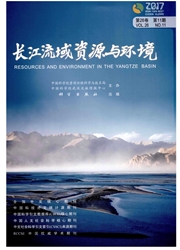

 中文摘要:
中文摘要:
城市化过程对气候变化有着重要影响,全面而准确的分析城市化进程是十分重要的。以南京市为例,利用南京地区1985~2007年年平均气温和1985~2010年源于统计年鉴的4类城市化指标数据,使用人工神经网络方法以及综合指标法,分析了南京市城市化综合发展水平变化及其热岛效应的关系。结果表明:南京城市化进程分为稳步发展阶段(1985~2000年)和快速发展阶段(2001~2010年),城市化综合评价指数增长速率分别为0.1/1Oa和0.6/1Oa;南京市1985~2007年年平均气温呈波动式上升,平均城郊温差0.3℃,温度差异明显,总体上热岛强度呈波动增加趋势,尤其2000年之后,以0.19℃/lOa的速率迅速增加;热岛强度与城市化综合评价指数之间相关系数为0.75,呈显著地线性相关关系。
 英文摘要:
英文摘要:
Urbanization process has outstanding influence on the climate change. It's very important to analyze the urbanization process comprehensively and accurately. The researches in the past often use single index method such as population to represent the process of urbanization. But urbanization is a comprehensive process which can reflect the level of regional economic, social and culture development. In this paper,a new method was used to calculate the urbanization comprehensive evaluation index,and the relationship between urbanization process and urban heat island was discussed. Taken Nanjing as an example, four outstanding urbanization index data from 1985 to 2010 had been selected, including urban population, power consumption, civil car ownership and waste gas emissions. Based on the back propaqation (BP) artificial neural networks, the weight of each index was calculated. Combined with aggregative indicator method, the urbanization comprehensive evaluation index presenting the comprehensive urbanization level was built, and the heat island effect in Nanjing was analyzed by anual average temperature (1985- 2007). Meanwhile, in order to discuss the relationship between urbanization process and urban heat island, correlation analysis was conducted. The results show as follows. (1) The weights of evaluation index by BP artificial neural network were all large, especially the civil car ownership reached 29.19%. It indicated that population, energy, environment and other aspects of urbanization process were of great significance to the urban development level evaluation. Thus, single index method is not accurate. (2) The new method in this paper could present the urbanization prcess better. The urbanization comprehensive evaluation index had a good perform to present the urbanization process of Nanjing. It was divided into two stages in Nanjing. One was stable development stage (1985-2000) and another was rapid development stage (2001- 2010). The growth rate of urbanization comprehensive e
 同期刊论文项目
同期刊论文项目
 同项目期刊论文
同项目期刊论文
 期刊信息
期刊信息
